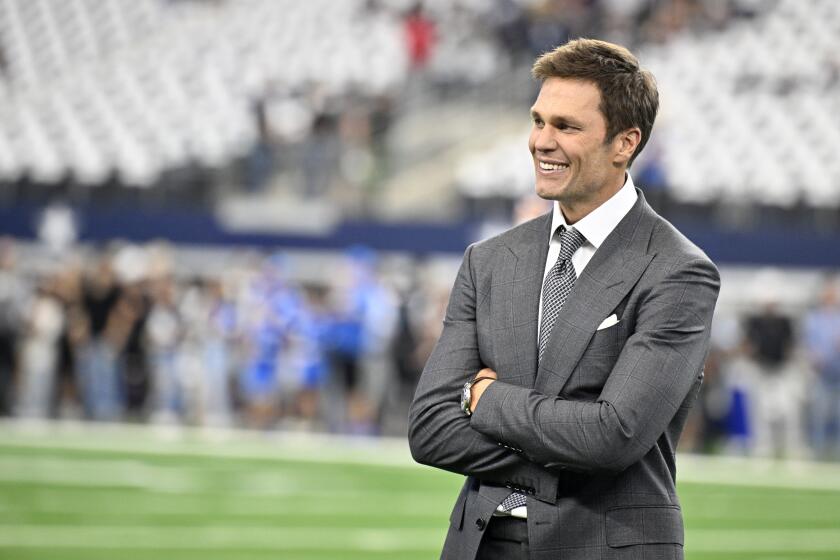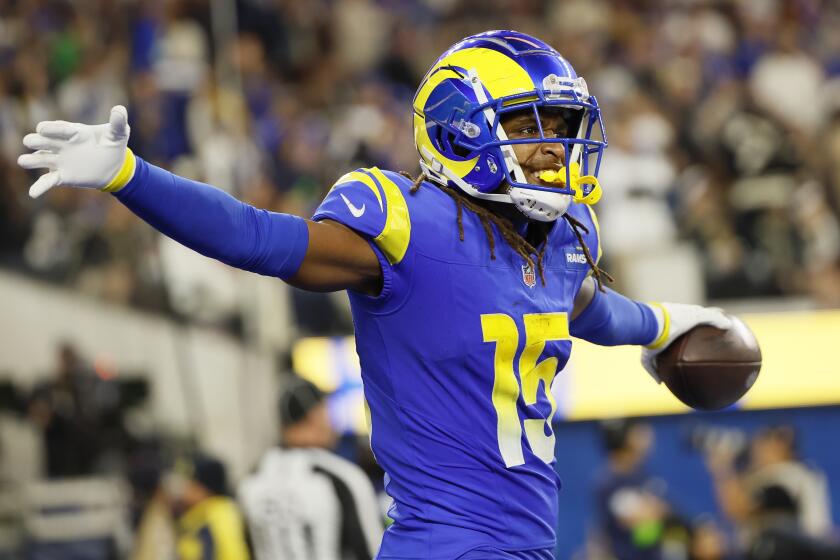Jamie McCourt’s Dodgers’ legacy is one of taking and not giving
One down, one to go.
As you have probably heard by now, Jamie McCourt has finally left the Dodgers, surrendering all claims to a team she used as her personal makeup mirror.
The cost to her ex-husband Frank McCourt will be $130 million.
The idea that she will no longer be around to abuse one of the greatest opportunities ever enjoyed by a female sports executive is priceless.
Even if Frank McCourt is somehow able to maintain ownership of the team, his bitter half is gone, and we should mark the occasion with a moment of sigh-lence.
Sigh. It could have been so much different. Sigh. She could have done so much more.
While both parties will forever share equal blame in this Dodgers mess, Jamie’s legacy is tainted even further because, in some ways, her responsibility was even greater.
Frank was never anything more than an East Coast real estate charlatan, but Jamie was supposed to be different. She was a lawyer with an MBA from MIT. She had quick wits and a sharp tongue. She was smart and strong and supposedly in defiance of every ancient stereotype about a woman in sports management.
She showed up nearly eight years ago as the highest ranking female executive in baseball, one of the most empowered female executives in sports history, and think of the possibilities.
She was going to open doors, open eyes, act like a living, breathing Title IX as she filled the Dodgers front office with a new inclusiveness and the community with a new energy.
At the McCourt’s introductory news conference, she was smart enough to grasp the arm of a stranger named Vin Scully. Back home, a Boston Harbor Assn. official named Vivien Li gave the Boston Herald the scoop about the Dodgers’ exciting new leadership.
“People will say she is just window dressing, but let me tell you, there is nothing window dressing about Jamie McCourt,” Li said.
Turns out, she was nothing but window dressing, cute and decorative and completely devoid of reality. While it was Frank’s whacked vision that robbed the Dodgers of their soul, it was Jamie’s clumsy machinations that took away their heart.
Together they didn’t know anything about owning or running a baseball team, but they had too much ego to ask, so they walked into Chavez Ravine blindly pounding the team’s infrastructure as if one of baseball’s most revered franchises was a blue-and-white piñata. While both took their whacks, the furious tone was set by Jamie, who fired some good people, forced some other good people to quit, and generally created a bullying atmosphere that did not encourage good people to join.
She tried to rebuild the organization in her image because, as it turns out, she was only concerned with that image. She preached community but only practiced Jamie. She talked about teamwork but only huddled with Jamie.
She ripped ticket salespeople by complaining that, “They should have been drawing more than 4 million fans.” Yet former club president Dennis Mannion, in a court declaration on behalf of Frank, said she “exhibited an almost disdainful disregard for the fundamental requirements of the job and workplace etiquette.”
She warned her staff that, “We expect an enormous amount of accountability.” Yet whenever the heat rose, she disappeared, failing to be accountable to the city that she claimed to embrace. I attempted to interview her for this column, just as I have attempted to interview her several times in the last year, and am still waiting for an answer.
In Jamie McCourt’s biggest delusion of grandeur, she claimed to be “the face of the Dodgers.” Yet everyone knows the team’s true legacy lies in the faces of its loyal fans whom she betrayed, most of whom would not even recognize Jamie if they passed her on the street.
While Frank was off preening for the cameras, there was an opportunity for Jamie to serve those fans by running things around Dodger Stadium, yet she showed little concern for the public beyond hearing their cheers when she would kiss her then-husband in the owner’s box after big victories.
Several years ago, I remember confronting Jamie on the field about the rising violence in the stands, and suggested that perhaps the increased playing of gangster rap and the endorsement of Snoop Dogg as a video board celebrity fanned the flames.
She look at me and laughed, saying, “Aw, everybody’s just having a good time.”
When Jamie arrived, I had hopes that she would raise the bar for female executives in the manner of the Lakers’ Jeanie Buss, who has transformed herself into one of the most publicly trusted members of the organization by listening and learning and working.
Those hopes were dashed a couple of years ago during the Manny Ramirez negotiations when Jamie popped off about how fans would rather use the money for youth league fields.
“If you bring in somebody to play and pay them … $30 million … we’re really trying to see it through the eyes of our fans … would they rather have the 50 fields?” she said.
Suddenly it became obvious that she intended to own the Dodgers not as a baseball team trying to win championships, but as a McCourt vehicle trying to win political friends. She not only couldn’t run the Dodgers, she had absolutely no concept of the Dodgers.
In the end, Jamie McCourt’s legacy will not be what she did, but what she didn’t do. Her legacy will not about court-alleged indiscretions or unconscionable support demands, but about her failure to turn that aggressiveness into community leadership and championship baseball.
She didn’t manage. She didn’t mentor. She could have changed our world, but instead seemingly cared only about spending thousands to change the flowers in an office that was finally taken from her, by a team that has finally, mercifully, been released from her grip.
One down, one to go.
Twitter.com/billplaschke
More to Read
Go beyond the scoreboard
Get the latest on L.A.'s teams in the daily Sports Report newsletter.
You may occasionally receive promotional content from the Los Angeles Times.











